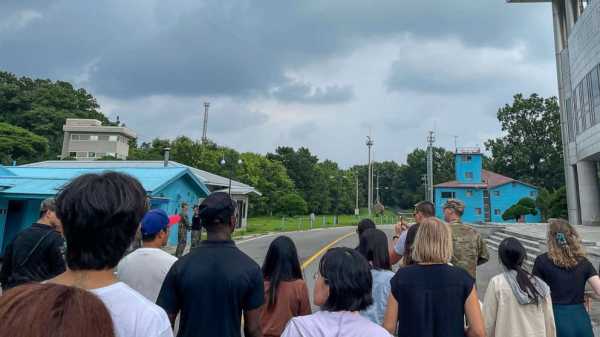Almost 72 hours after 23-year-old U.S. Army Private 2nd Class Travis King entered North Korea, American officials say they have not been able to gain clarity on his location or condition — and even the circumstances that led him to cross the border remain a mystery.
The Pentagon announced on Thursday that Army counterintelligence officials were investigating what prompted King to separate from a tour group visiting the Demilitarized Zone dividing South and North Korea, where witnesses say he sprinted across the border sometime on Tuesday.
He was originally supposed to fly out of Seoul after being taken to the airport on Monday, officials have said. Back in Texas, he was set to face a "pending administrative separation actions for foreign conviction," one U.S. official has said. He had been in detention for more than a month after an altercation with locals, according to an official.
So far, efforts to gather information have been hamstrung by Pyongyang's stonewalling. Although various agencies and intermediaries have attempted to communicate with the North Korean government about King, none say they have received any response and the country's state media has also remained uncharacteristically silent.
"We're still doing everything we can to try to find out his whereabouts, his well-being and condition and making it clear that we want to see him safely and quickly returned to the United States and to his family," White House spokesman John Kirby said Thursday.
"Not for lack of trying, we just don't have anything," he said.
MORE: ABC News Exclusive: Inside the US nuclear ballistic missile submarine in South Korea
One U.S. official said that after King entered North Korea, he was immediately taken away in a van. But the Pentagon says they see no reason to suspect the soldier pre-planned his crossing with the North Korean government.
Asked whether the State Department feared for King's safety, its spokesperson Matthew Miller said Thursday that Pyongyang's past treatment of American nationals held in its custody was cause for worry.
"Certainly, I think we would always have concern given the treatment by North Koreans of past detained individuals — we would have that concern and that's why, one of the reasons why, we are reaching out to ask for more information about his well-being," he said.
But those asks continue to go unanswered — illustrating just how much communication between the countries has deteriorated under the Biden administration.
Although the U.S. government has made multiple attempts to engage with Pyongyang on issues like nuclear proliferation, those efforts have yet to elicit any response from the hermit kingdom.
"There is no regular contact. I will say communications between our two countries are limited," Miller said.

A group of tourists stand near a border station at Panmunjom in the Demilitarized Zone in Paju, South Korea, July 18, 2023. Not long after this photo was taken, Travis King, a U.S. soldier, bolted across the border and became the first known American detained in the North in nearly five years.Sarah Jane Leslie/AP
Anthony Ruggiero, senior director of the Foundation for Defense of Democracies' Nonproliferation and Biodefense Program and the former deputy assistant to the president for national security affairs, said North Korea may just be biding its time.
"They're probably taking the time to speak with [King] and see what to do next," Ruggiero said.
In prior cases involving Americans held in North Korea, Pyongyang has ignored outreach from the U.S. and Sweden — America's diplomatic liaison in North Korea — for weeks on end.
Ruggiero said that Pyongyang could seek to turn the latest incident into "a benefit" if it senses having the American soldier in its custody is a source of diplomatic pull.
If that's the case, Ruggiero explained, its reticence to engage with U.S. officials could evaporate.
"I think you're likely to see that the North Koreans want to talk to an American official directly as possible," he predicted.
MORE: US military emails sent to Mali because of common typo
Kim Jong Il, the former supreme leader of North Korea and father of its current ruler, Kim Jong Un, approved the release of American detainees after visits from former Presidents Jimmy Carter and Bill Clinton.
But even if there is direct contact between the U.S and North Korea, Ruggiero and other experts expect that the Biden administration will be reluctant to expend any significant political capital to secure the freedom of a soldier who fled while facing disciplinary action.
If that's the case, North Korea may elect to release King, Ruggiero said, as they did with Bruce Byron Lowrance — a U.S. national who entered North Korea in 2018 and was freed a month later — a move that helped set the stage for the first summit between then-President Donald Trump and Kim Jong Un.
"The North Koreans may believe that this is more headache than it's worth," Ruggiero said.
Sourse: abcnews.go.com






